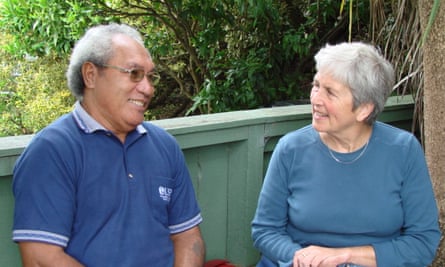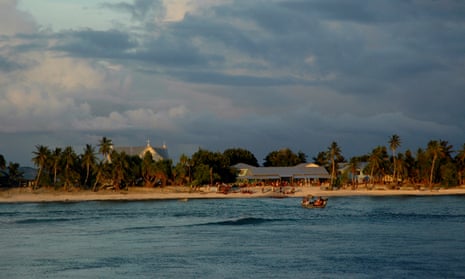In 2006, two lacquered wooden chests and a crate of champagne were ferried 507km from Samoa to Tokelau, a collection of atolls scattered across the Pacific which are home to 1,500 people. Over three days the chests were carried between atolls to collect ballots in a referendum on whether Tokelau should move, finally, towards self-governance.
Since 1946, Tokelau – one of the most remote places in the world – has been classed by the United Nations as a non-self-governing dependent territory: a colony. First colonised by Britain in 1877, in 1925 Tokelau was essentially given to New Zealand, which has administered it since.
Over the following century decolonisation movements accelerated globally and the list of non-self-governing territories shrank from 72 to 17. Officials from both New Zealand and the UN hoped that in 2006 Tokelauans would shrink the list even further; the champagne crate was brought in anticipation of a “Yes” vote.
Those hopes were dashed. The referendum fell 36 votes short of the required two-thirds majority. The champagne was packed away. It became apparent that while New Zealand and the UN were eager for Tokelauan self-determination, some Tokelauans were confused and concerned. Although the proposal for self-governance (an intermediary step short of independence) would have involved Tokelau maintaining a close political relationship with New Zealand, one resident of Atafu atoll explained at the time that, “There’s a fear all around here [that] after 10 years, New Zealand might say, ‘OK, you’re ready to go on your own’.” After a second attempt failed in 2007, discussions about self-governance all but disappeared. According to Kelihiano Kalolo, the Ulu-o-Tokelau (national leader), “We haven’t discussed this for quite a long time … Nobody ever talks about it.”

That will change in December, when Kalolo will reinvigorate the self-governance discussion by tabling a paper in Tokelau’s general fono (parliament) pushing Tokelauans to imagine a new future for the atolls ahead of the centenary of New Zealand rule in 2025. His proposal represents the latest salvo in Tokelau’s fraught debate over whether decolonisation must always involve independence.
Setting Tokelau up to fail?
Kalolo will propose three options for Tokealauans to consider: self-governing in free association with New Zealand, full independence from or integration with New Zealand. Two other nations, Niue and the Cook Islands, already self-govern in free association with New Zealand. Prior to the referendums, self-governance advocates argued it would minimise New Zealand paternalism and allow Tokelau to receive aid from more countries. Tokelau’s government relies on the sale of fishing licenses for its large exclusive economic zone and roughly $16m in New Zealand aid annually. New Zealand has previously emphasised that if Tokelau moved towards self-governance, residents would still have access to New Zealand support and passports.
In July, Tokelauans saw the benefits in an unpredictable world of a close affiliation with New Zealand, when the HMNZS Wellington dropped anchor near Nukunono atoll and two sailors in full protective gear used a small inflatable boat to bring ashore 12 boxes of Covid-19 vaccines. Nukunono’s elders watched the delivery with delight, singing songs under a banner reading “Welcome”.
Recognising abiding concerns among some Tokelauans that self-governance would jeopardise that relationship, Kalolo said he will also push residents of the atolls to consider options like full integration with New Zealand – a significant change from the referendums, which only proposed self-governance or remaining a dependent territory.
That willingness to consider options other than self-governance was welcomed by Ioane Teao, the president of the Wellington Tokelau Association in New Zealand and a longtime critic of political leaders on the atolls. “It’s news to me that they’re including integration, because that option was not proposed to the people last time … I’m glad to hear they’re now placing it on the table.”
Integration is supported by many in the Tokelauan diaspora, which is at least five times larger than the population of Tokelau itself. Teao, for example, worries that self-governance could endanger the diaspora’s relationship with Tokelau or negatively empower a small political “elite” on the atolls. By opting for self-governance or independence, said Teao, “My worry is that we may be setting Tokelau up to fail.”
The irony of self-governance efforts
As this debate emerges, New Zealand’s Ministry of Foreign Affairs and Trade (MFAT) has taken a hands-off approach. Ross Ardern, the current administrator of Tokelau and father of New Zealand prime minister Jacinda Ardern, emphasised his commitment to partnering with Tokelau “to achieve a self-determination outcome that fits the local Tokelauan context … Where a self-determination option involves an ongoing relationship between Tokelau and New Zealand, the nature of that relationship will be one that is acceptable to both and New Zealand would expect that Tokelau would lead on that”.

It’s a different approach to that taken by MFAT previously. Prior to the referendums Neil Walter, then the administrator, advocated so forcefully for self-governance that some Tokelauans nicknamed him “afā” (cyclone). Judith Huntsman, an Auckland University academic who specialises in Tokelau’s politics and history, said the focus on self-governance which characterised previous discussions of Tokelau’s future was the result of the UN and MFAT “suppress[ing]” options like integration. Huntsman has previously suggested New Zealand’s forthright support for self-governance was largely because MFAT wanted to get New Zealand off the UN’s formal list of colonising powers.
This is the irony of previous self-governance efforts: they often seemed more driven by outsiders than by Tokelauans themselves. In 2004, a press release attributed to the Ulu-o-Tokelau said of self-governance, “We’ve said this to the UN and to New Zealand … Why do we want to do this? Is it to satisfy you or to satisfy us?” So few Tokelauans openly advocated for self-governance that Walter confessed at the time that, “I’d be glad of an independence firebrand, frankly.”
Kalolo hopes to change that sentiment by prompting Tokelauans to reclaim control of and consider every option for their future. In a book co-written with Huntsman, he emphasised that “the oft-spoken saying during the [2006] Referendum [was]: Ko au e hē malamalama – ‘I do not understand’.” In an interview he emphasised, “I just want people to understand the three options … Whether people are willing to take up self-determination again or not, that’s their choice.”
